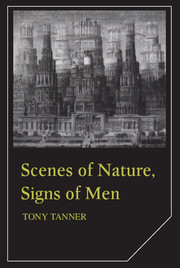Book contents
- Frontmatter
- Contents
- Preface
- 1 Scenes of nature, signs of men
- 2 Notes for a comparison between American and European Romanticism
- 3 Problems and roles of the American artist as portrayed by the American novelist
- 4 James on Hawthorne
- 5 The lost America – the despair of Henry Adams and Mark Twain
- 6 Henry James and Henry Adams
- 7 William Dean Howells and A Hazard of New Fortunes
- 8 Stephen Crane
- 9 The Bostonians and the human voice
- 10 Games American writers play: ceremony, complicity, contestation, and carnival
- 11 Toward an ultimate topography: the work of Joseph McElroy
- 12 Frames and sentences
- 13 William Gass's barns and bees
- Index
3 - Problems and roles of the American artist as portrayed by the American novelist
Published online by Cambridge University Press: 01 June 2011
- Frontmatter
- Contents
- Preface
- 1 Scenes of nature, signs of men
- 2 Notes for a comparison between American and European Romanticism
- 3 Problems and roles of the American artist as portrayed by the American novelist
- 4 James on Hawthorne
- 5 The lost America – the despair of Henry Adams and Mark Twain
- 6 Henry James and Henry Adams
- 7 William Dean Howells and A Hazard of New Fortunes
- 8 Stephen Crane
- 9 The Bostonians and the human voice
- 10 Games American writers play: ceremony, complicity, contestation, and carnival
- 11 Toward an ultimate topography: the work of Joseph McElroy
- 12 Frames and sentences
- 13 William Gass's barns and bees
- Index
Summary
It is truism that from the start the American writer has been on the defensive about his vocation. When Martin Chuzzlewit, on his arrival in America, tries to find out something about the state of American literature, he is sharply told: ‘We are a busy people, sir, … and have no time for reading mere notions. We don't mind 'em if they come to us in newspapers along with almighty strong stuff of another sort, but darn your books.’ Darn your books – very often that seems to be the public response that the American writer dreads in advance, and it seems to induce not only a vague sense of guilt about his calling, but on occasions more self-destructive feelings. Whether he sets about evoking a romance of the past, or attempts to address himself to contemporary realities, the American novelist usually betrays an apprehension that his role will somehow set him at odds with his society. This is, of course, no new position for the artist to find himself in. The difference seems to be the degree of anxiety and vulnerability experienced by the American artist: European artists may be equally alienated from their societies, but they seem able to draw confidence from the artistic traditions behind them. It is this sort of confidence which seems unavailable to many American writers.
- Type
- Chapter
- Information
- Scenes of Nature, Signs of MenEssays on 19th and 20th Century American Literature, pp. 46 - 63Publisher: Cambridge University PressPrint publication year: 1987

